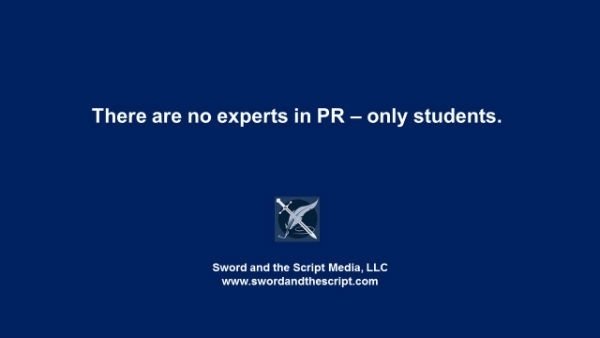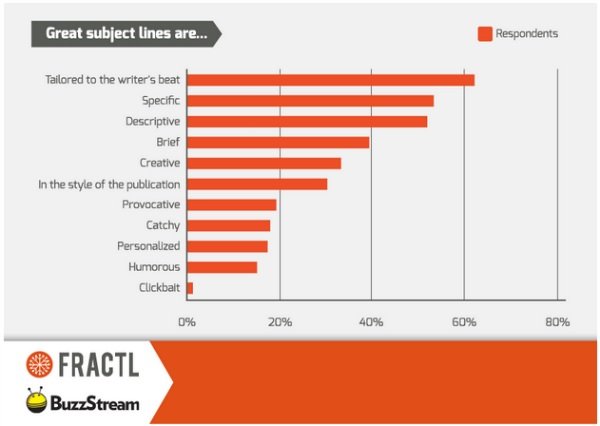New Lessons on PR Tradition: Audience, Subject Lines & Newsjacking
 By Frank Strong, Founder & President of Sword and the Script MediaThere are no experts in PR – only students.It’s more than a snappy quote, it’s a philosophy. The expert that knows everything is prone to get blindsided by the unexpected on an otherwise idle Tuesday.Public Relations is dynamic. Reporters swap beats and publications. Business priorities shift. Platforms and publishing tools change. Skills are perishable.Learning, lessons and continuous improvement are fundamentals of good PR professionals. And that’s theme for this week’s Unscripted Marketing links (UML) roundup – new lessons on PR traditions: audience segmentation, subject lines and newsjackingBelow you’ll find three articles I’ve vetted and selected some points to highlight. As always, I encourage readers to spend some time reviewing the original sources I cite.
By Frank Strong, Founder & President of Sword and the Script MediaThere are no experts in PR – only students.It’s more than a snappy quote, it’s a philosophy. The expert that knows everything is prone to get blindsided by the unexpected on an otherwise idle Tuesday.Public Relations is dynamic. Reporters swap beats and publications. Business priorities shift. Platforms and publishing tools change. Skills are perishable.Learning, lessons and continuous improvement are fundamentals of good PR professionals. And that’s theme for this week’s Unscripted Marketing links (UML) roundup – new lessons on PR traditions: audience segmentation, subject lines and newsjackingBelow you’ll find three articles I’ve vetted and selected some points to highlight. As always, I encourage readers to spend some time reviewing the original sources I cite.  1) Even in Crisis, Focus on the Right Audience“Don’t forget your target audience,” writes Owen Walker in an opinion piece titled What corporate PRs Can Learn From Activist Investors. He agrees this is basic advice, but also a lesson easily forgotten when things get thick. He says “it is easy to get distracted and lose sight of the most important constituents.”The author of a newly published book on the rise of activist investors — Barbarians in the Boardroom – he provides this example:“Hedge fund Starboard Value was lampooned on every late-night talk show in September 2014 over its 296-page detailed critique of the restaurant chain Olive Garden and its parent company, Darden. The following morning Starboard was inundated with emails and calls from angry diners who feared the hedge fund would end Olive Garden’s popular unlimited breadstick policy.Yet Jeff Smith, Starboard’s CEO, told me he never regretted going into such detail as he felt it was necessary to win over the highly influential proxy advisers in his campaign against Darden. The breadstick furore [sic] died down and Starboard eventually took over the whole Darden board, with Smith installed as chairman.”It’s a good reminder that business isn’t a democracy. There is no popular vote. It’s useful for the guardians of corporate reputation to remember the sentiment dashboard doesn’t necessarily tell you if you’re winning or not.Mr. Walker has two more lessons worth reading in the full article.2) Can you Newsjack with Class?Newsjacking may well be an unfortunate term that describes what solid media relations professionals have done all along: tie story ideas to trends. Despite the (recurring) debate in PR over the term those that read the book will find some new applications that continue to be proven in survey research years after it was published.There are also some new lessons to be gleaned. In a piece titled How to Leverage Newsjacking Without Being a Jerk guest writer Michael Georgiou offers handful including this one: “never just regurgitate the news.”“Offer something new to readers, not just the same facts and details they can read in the major news outlets. Newsjacking is about capitalizing on the trending news, not re-reporting it. For example, you can explore leadership and marketing skills utilized during the 2016 election. Give readers some insight that only you can provide.”3) Pitching? Subject Lines Matter
1) Even in Crisis, Focus on the Right Audience“Don’t forget your target audience,” writes Owen Walker in an opinion piece titled What corporate PRs Can Learn From Activist Investors. He agrees this is basic advice, but also a lesson easily forgotten when things get thick. He says “it is easy to get distracted and lose sight of the most important constituents.”The author of a newly published book on the rise of activist investors — Barbarians in the Boardroom – he provides this example:“Hedge fund Starboard Value was lampooned on every late-night talk show in September 2014 over its 296-page detailed critique of the restaurant chain Olive Garden and its parent company, Darden. The following morning Starboard was inundated with emails and calls from angry diners who feared the hedge fund would end Olive Garden’s popular unlimited breadstick policy.Yet Jeff Smith, Starboard’s CEO, told me he never regretted going into such detail as he felt it was necessary to win over the highly influential proxy advisers in his campaign against Darden. The breadstick furore [sic] died down and Starboard eventually took over the whole Darden board, with Smith installed as chairman.”It’s a good reminder that business isn’t a democracy. There is no popular vote. It’s useful for the guardians of corporate reputation to remember the sentiment dashboard doesn’t necessarily tell you if you’re winning or not.Mr. Walker has two more lessons worth reading in the full article.2) Can you Newsjack with Class?Newsjacking may well be an unfortunate term that describes what solid media relations professionals have done all along: tie story ideas to trends. Despite the (recurring) debate in PR over the term those that read the book will find some new applications that continue to be proven in survey research years after it was published.There are also some new lessons to be gleaned. In a piece titled How to Leverage Newsjacking Without Being a Jerk guest writer Michael Georgiou offers handful including this one: “never just regurgitate the news.”“Offer something new to readers, not just the same facts and details they can read in the major news outlets. Newsjacking is about capitalizing on the trending news, not re-reporting it. For example, you can explore leadership and marketing skills utilized during the 2016 election. Give readers some insight that only you can provide.”3) Pitching? Subject Lines Matter  Most reporters believe PR pitches are “at least ‘slightly valuable’” according to Lillian Podlog of Fractl. They also get a lot of pitches, so if you want to earn their consideration for a story idea, the subject line really matters.That’s not just opinion or experience, it’s data, as Ms. Podlog writes in a piece titled What 26,000 Pitches Taught Us About Securing Top-Tier Press. She draws several conclusions worth perusing in their entirety; here are few that stood out for me:“Nearly two-thirds of publishers determine whether or not to open an email based on the subject line. In subject lines, every word counts.”And later:“While writers might respond to humor and geographic ego bait, these tactics are secondary to a targeted pitch. More than 60% of writers agreed that great subject lines are tailored to a writer’s beat, but fewer than 20% agreed that humor is essential.”In addition to calling out what works, this piece also found what doesn’t:“Publishers are more likely to be interested if you highlight the content of the project rather than just its format. “Interactive, “data,” and “video” all showed low success rates (“map” was not far behind).”Separately, Fractl has also done several studies of social media as well. Two were included in this UML post published previously: Social Sharing Fills Different Needs than Search; Unscripted Marketing.[author]About the Author: About the Author: Frank Strong is the founder and president of Sword and the Script Media, LLC, a veteran-owned PR, content marketing and social media agency in greater Atlanta.[/author]
Most reporters believe PR pitches are “at least ‘slightly valuable’” according to Lillian Podlog of Fractl. They also get a lot of pitches, so if you want to earn their consideration for a story idea, the subject line really matters.That’s not just opinion or experience, it’s data, as Ms. Podlog writes in a piece titled What 26,000 Pitches Taught Us About Securing Top-Tier Press. She draws several conclusions worth perusing in their entirety; here are few that stood out for me:“Nearly two-thirds of publishers determine whether or not to open an email based on the subject line. In subject lines, every word counts.”And later:“While writers might respond to humor and geographic ego bait, these tactics are secondary to a targeted pitch. More than 60% of writers agreed that great subject lines are tailored to a writer’s beat, but fewer than 20% agreed that humor is essential.”In addition to calling out what works, this piece also found what doesn’t:“Publishers are more likely to be interested if you highlight the content of the project rather than just its format. “Interactive, “data,” and “video” all showed low success rates (“map” was not far behind).”Separately, Fractl has also done several studies of social media as well. Two were included in this UML post published previously: Social Sharing Fills Different Needs than Search; Unscripted Marketing.[author]About the Author: About the Author: Frank Strong is the founder and president of Sword and the Script Media, LLC, a veteran-owned PR, content marketing and social media agency in greater Atlanta.[/author]

